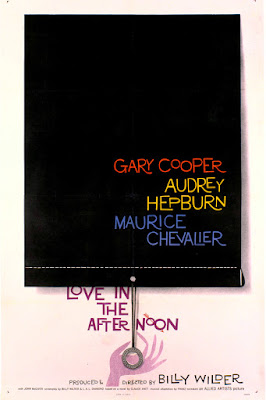Audrey Hepburn stars as Ariane, a sheltered young woman who is looking for some excitement in her boring, sheltered life. Her loving but controlling father Claude (Maurice Chevalier) is a detective who specialises in uncovering infidelity cases. Unbeknownst to him, Ariane spends her free time reading his files, and wishes she could have a romantic dalliance of her own.
An opportunity arises when Claude accepts a new assignment from a Monsieur X (John Irwin McGiver) who believes his wife is having an affair. The culprit turns out to be world class ladies man Frank Flannagan (Gary Cooper), an individual that both Claude and Ariane are very familiar with.
Realising that Monsieur X intends to kill Flannagan, Ariane goes to his hotel and tips him off. Flannagan is intrigued by this mysterious stranger, a mystery Ariane stokes by using her father's cases to build a background of affairs to rival Flannagan's own. Intimidated, Flannagan believes he has finally met his match.
The movie was intended as Wilder's homage to his mentor Ernst Lubitsch, and while it never quite reaches the same heights as Lubitsch's work, it remains an extremely deft, funny and (for Wilder) warm film about the idiocies and hypocrisies of romantic ettiequte.
Love in the Afternoon is not as great as the other Wilder-Hepburn joint, Sabrina, but it's damn good. Check it out, preferably with some bubbles and a box of chocolates.
Meanwhile, Claude's suspicions are piqued and he eventually figures out what his daughter has been up to...
Love in the Afternoon would be a great romantic comedy, if it was not for one flaw: casting. Gary Cooper was a big star, famous for his understated and down-to-earth persona. And that's a problem. While his performance is perfectly fine, he lacks the continental sophistication to be believable as a cocksman (ironically, Cooper's personal life was not that far off his character's). Originally, Cary Grant was in the frame to play Frank, which would have made more sense
The other problem is his age. Cooper was pushing 60 at the time, but looks considerably older. Opposite the 20-something Hepburn (playing 18), it makes for an uneasy dynamic. Thanks to Wilder's sure touch and the strong script, this discrepancy is mitigated, but it's still there.
Other than that, Love in the Afternoon is a joy. Maurice Chevalier, a big Hollywood star in the 30s, steals every scene he is in as Claude, the Paris setting is well utilised and the script (by Wilder and frequent collaborator I.A.L. Diamond) sparkles with wit and a welcome dash of cynicism.
The movie was intended as Wilder's homage to his mentor Ernst Lubitsch, and while it never quite reaches the same heights as Lubitsch's work, it remains an extremely deft, funny and (for Wilder) warm film about the idiocies and hypocrisies of romantic ettiequte.
Love in the Afternoon is not as great as the other Wilder-Hepburn joint, Sabrina, but it's damn good. Check it out, preferably with some bubbles and a box of chocolates.





No comments:
Post a Comment